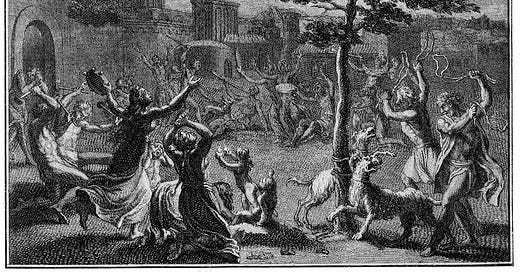Class consciousness, rationalism, and the rise of peasant brain
What exactly is class consciousness, anyway?
Carl Sagan, in The Demon-Haunted World, celebrates our ability to predict solar eclipses as the culmination of millenia of human curiosity and intelligence. “If you want to know when the next eclipse of the Sun will be, you might try magicians or mystics, but you’ll do much better with scientists,” he writes.
They will tell you where on Earth to stand, when you have to be there, and whether it will be a partial eclipse, a total eclipse, or an annular eclipse. They can routinely predict a solar eclipse, to the minute, millennium in advance… Think of how many religions attempt to validate themselves with prophecy…has there ever been a religion with the prophetic accuracy and reliability of science?
I thought about Sagan last week as the United States prepared for the last total solar eclipse our country will see until 2045. There was, in the discourse, the usual round of celebration for science that always comes with high-profile astronomical events like this — but there was also something else. Marjorie Taylor Greene, in a strange fit of blasphemy1, warned that “God is sending America strong signs to tell us to repent. Earthquakes and eclipses and many more things to come.” Another viral post, noting the death of Peter Higgs, wrote “God Particle man of Higgs-Boson dies during the eclipse as Cern fires back up. Is this sus enough for you yet?” And most disturbingly, Danielle Johnson — an astrologist and social media influencer — killed her partner, one of her children, and herself after warning that the eclipse was a sign that “the apocalypse is here.”
Jaded readers may dismiss these incidents as more of the usual lunacy we’ve seen on social media for ages, but I cannot help but see in them a rising tide of irrationality that has not always been with us in this way. There were plenty of kooky and superstitious ideas in circulation among the conservative neighborhood kids I watched the eclipse with in 1994, but even among us it never occurred to anyone to interpret the event as anything other than a passing shadow. That the moon occasionally blocks out the sun because of the way the orbits work out was just a mundane fact that we all took for granted. This was in fact part of the genius of Sagan: his recognition that so many people, in the late twentieth century, had come to take scientific progress for granted. That we no longer saw this knowledge as something we had painstakingly gained, and that we could lose.
So Sagan published The Demon Haunted World just a year after the eclipse in 1995. And in the opening pages, he quoted from a statement by the Chinese Communist Party:
Public education in science has been withering in recent years. At the same time, activities of superstition and ignorance have been growing, and antiscience and pseudoscience cases have become frequent… The level of public education in science…is a matter of overall importance in economic development, scientific advance, and the progress of society…ignorance is never socialist, nor is poverty.
In the age of ascendant neoliberalism, with global literacy rates skyrocketing and technological progress delivering world-changing innovations on a regular basis, Sagan and CCP were hardly the voices of consensus; today, however, it’s hard not to read their warnings as prophetic. Today, anti-vaccination sentiment has evolved from a fringe concern to a powerful political force. Among Republicans, belief in anthropogenic climate change has dropped 20 points over the last two decades. And today, the pseudo-scientific field of “race science” — thought deader than a doornail just a few decades ago — has come roaring back to life.
Keep reading with a 7-day free trial
Subscribe to Carl Beijer to keep reading this post and get 7 days of free access to the full post archives.





